Glass returnables as a driver of growth
Gerolsteiner Brunnen expands filling and sorting capacity for its individual packs
To keep up with the exceptional and over-proportional growth of its 0.75 litre individual packs, last year Gerolsteiner Brunnen implemented a further line for glass returnables. This line has a filling capacity of 36,000 bottles per hour and features an integrated sorting unit that can handle up to 20 percent of the incoming empties. The entire system was successfully accepted on December 21 and 22, 2021, and has since then proved its worth in day-to-day production. Time for a technical review.
Gerolsteiner Brunnen GmbH & Co. KG produces Germany’s best-selling brand of mineral water. There are currently 881 employees working at Gerolsteiner Brunnen, 53 of whom are trainees. Shareholders of Gerolsteiner Brunnen GmbH & Co. KG are Bitburger Holding (51%) and Buse KSW GmbH & Co. (32%). The remaining shares are in private free float.
The brand with the star mark is well known for its sparkling mineral water products Gerolsteiner Sprudel and Gerolsteiner Medium as well as the still mineral water Gerolsteiner Naturell. The product portfolio also includes the new products Gerolsteiner Feinperlig (slightly carbonated) and Ursprung (high mineral content), Gerolsteiner Heilwasser (medicinal water), Gerolsteiner Heilwasser St. Gero as well as mineral water-based beverages.
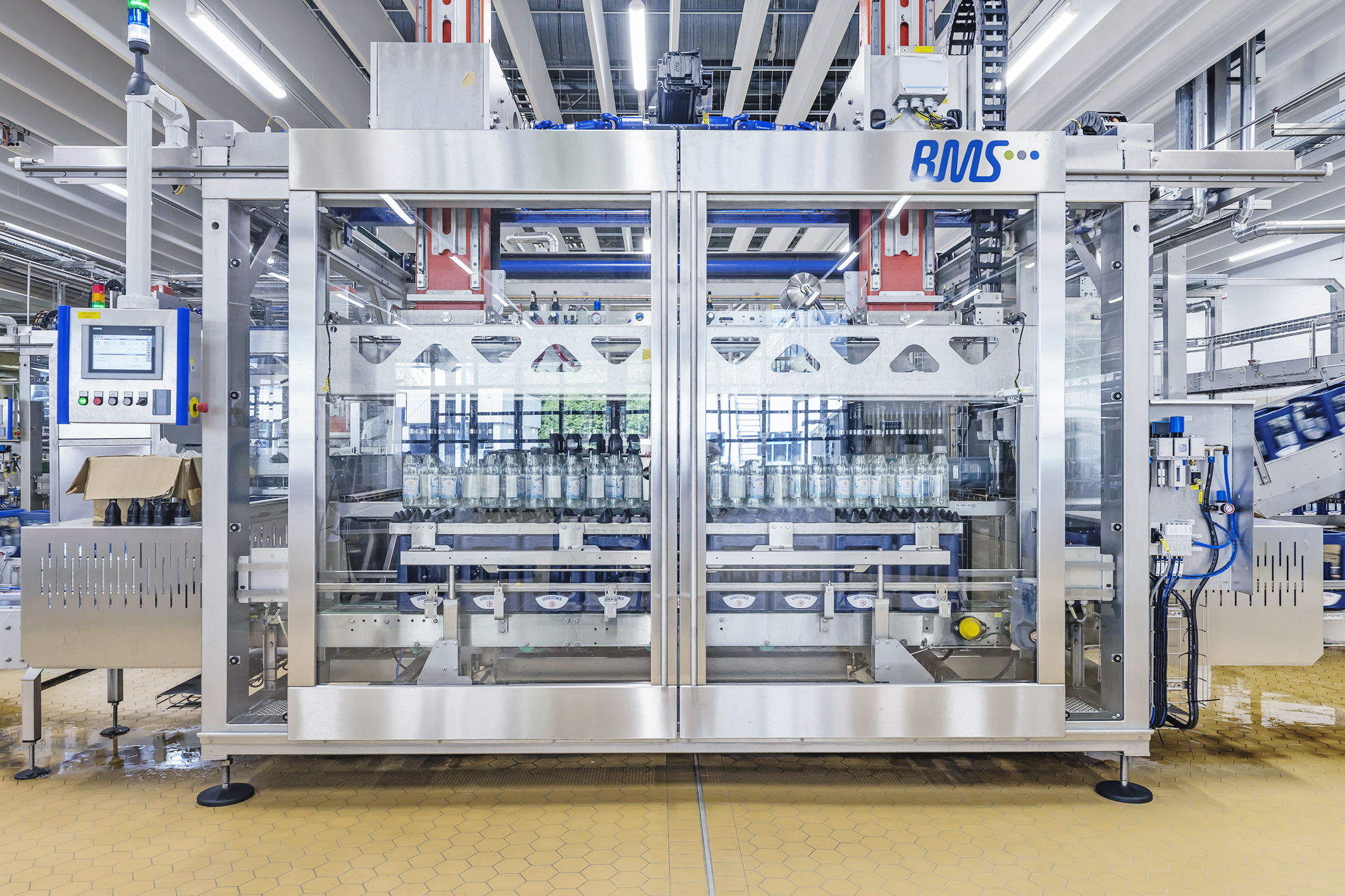 Three portal-type packers of the type Unipack 103 for the main type and the sorting were delivered to Gerolstein and integrated both mechanically and on the control side.
Three portal-type packers of the type Unipack 103 for the main type and the sorting were delivered to Gerolstein and integrated both mechanically and on the control side.
Market leadership extended despite Covid
As shown by the balance sheet for the fiscal year 2021, even and specifically during the Covid pandemic Gerolsteiner benefited once again from the brand’s strength, national marketing and from the fact that mineral water extracted from the Volcanic Eifel is available in such a wide range of variants and packs. Gerolsteiner’s mineral water sales grew by 2.3 percent, against the market trend. By comparison: the market sector lost 3.7 percent in the same period. Gerolsteiner was also able to expand its position as market leader from 9.6 percent in 2020 to now 10.2 percent. Thanks to this success, at the end of the 2021 fiscal year, net sales for the company overall were down only slightly to 285.6 million euro (2020: 291.9 million euro, -2.2%). Total sales in 2021 were 7.5 million hectolitres (2020: 7.6 million hectolitres, -2.0%).
Particularly Gerolsteiner’s range of glass returnables has grown over-proportionally in recent years. Growth drivers of this development are the state-of-the-art individual packs, such as the Gerolsteiner 6 x 1.0 litre glass returnables and the Gerolsteiner 12 x 0.75 litre glass returnables. This success story began in 2019 with the brand Gerolsteiner Naturell (still). A new filling line was built specifically for its individualisation. This was the first project at Gerolsteiner Brunnen to be implemented with BMS Maschinenfabrik GmbH. In 2020 there then followed a turnkey dry part including inline sorting. With a clear result: in June 2021 Gerolsteiner began with the construction of a pure 0.7 litre line with a filling capacity of 36,000 bottles per hour. Based on the consistent and positive experience gained in the two previous projects, Gerolsteiner again placed its trust in BMS for the same project area as with the 2020 plant, this being the dry part together with the sorting, as well as the packers of the wet part as a complete package.
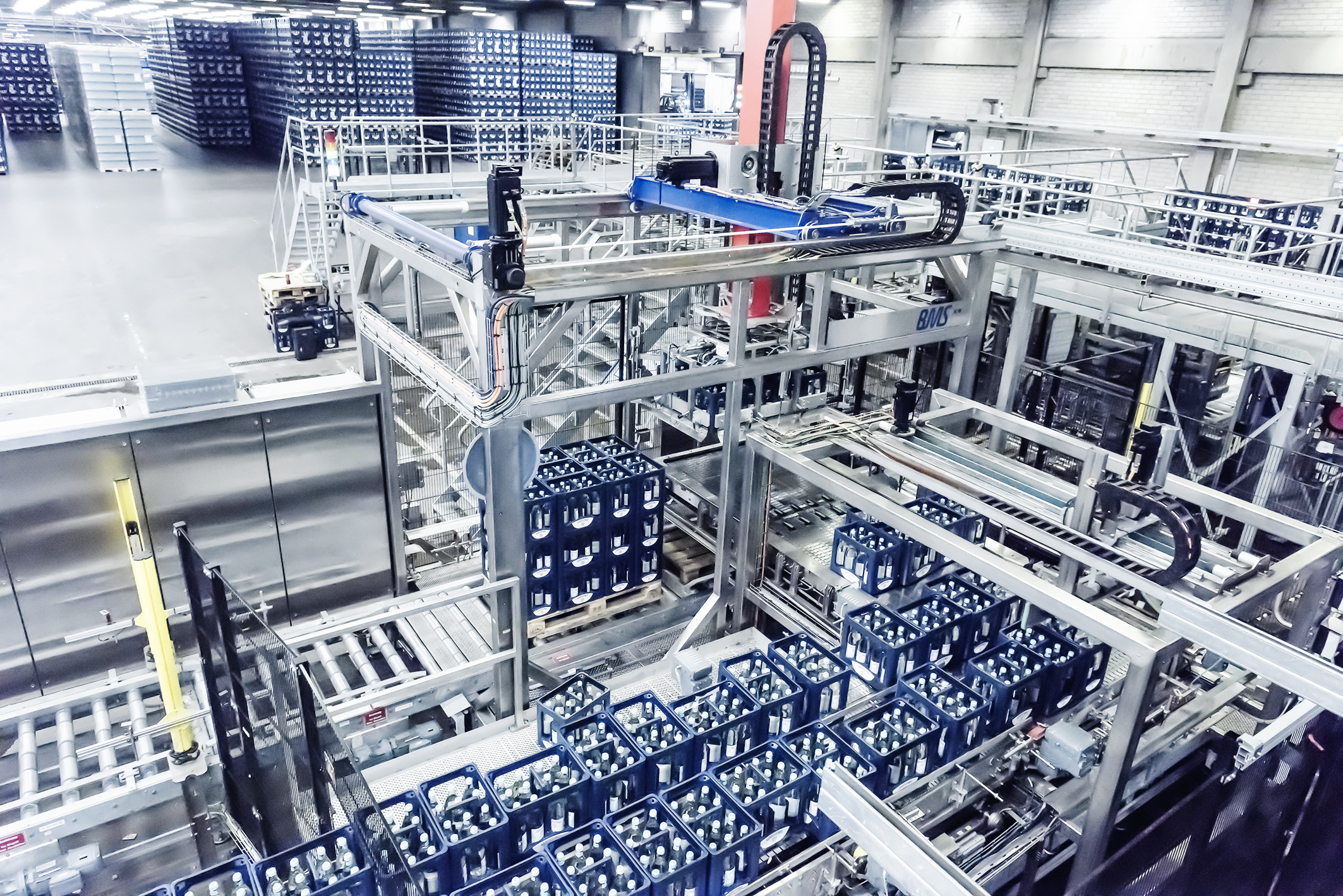 For the loading and unloading area, Gerolsteiner decided in favour of three portal-type palletisers of the proven type Unipal 105.
For the loading and unloading area, Gerolsteiner decided in favour of three portal-type palletisers of the proven type Unipal 105.
Strict specifications regarding the layout and implementation
“We prepare all our tenders here, ourselves. An important part in this process is a basic layout into which each of the suppliers can contribute their individual ideas”, explains Harald Jakoby, head of technical planning at Gerolsteiner. This layout defines the space available, for example. Jakoby explains further: “The area of the new plant 5 was previously occupied by a 60,000-bottle GDB returnables filling line. And there is now still room here for a future plant 6. By mirroring plant 5, for instance, we could approach an output of 72,000 bottles per hour on the same area.“
Gerolsteiner additionally required a clear separation of the wet and dry part. Moreover, the dry part was to include an integrated sorting system that can handle at least 20 percent of the incoming empties. “Due to the growing proportion of glass, we also require an increased amount of sorting. We have therefore specified 20 percent instead of the 10 percent sorting capacity of plant 4“, Jakoby adds.
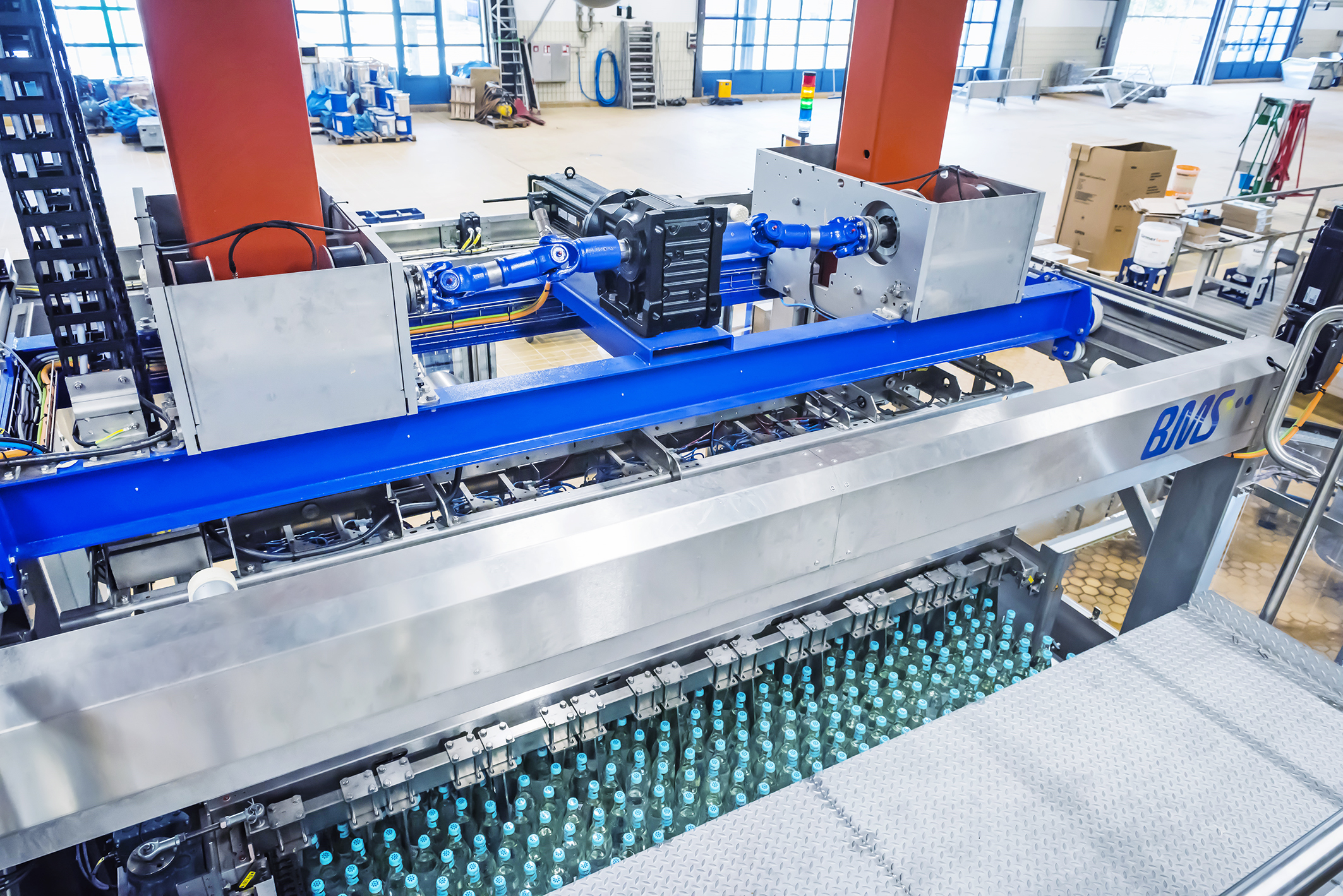 The robust and low-wear design of all machines was a decisive criterion for Gerolsteiner. A further positive aspect was that the entire control system, including the axes, is based on S7. “This makes in-house maintenance a lot easier to manage.“
The robust and low-wear design of all machines was a decisive criterion for Gerolsteiner. A further positive aspect was that the entire control system, including the axes, is based on S7. “This makes in-house maintenance a lot easier to manage.“
Gerolsteiner also has very clear ideas about how a machine is to be designed. Among other things, with regard to the materials used and the components to be installed. Other important factors are the costs of wear, spare parts and maintenance. There are also energy costs and other costs for resources that have to be considered. “One very clear and definite benefit we see with BMS is the very low wear. The spare part costs are also very favourable. This is where you can simply tell that someone wants to sell you high quality machines and not just earn money through the sales of spare parts“, Jakoby adds. He is also very pleased that the entire control system is based on S7 – even the axis control, for example, is based on this system. “This makes maintenance a lot easier to manage. Other suppliers install different controls in one system. Then only an external specialist can help, if action is needed“, Jakoby emphasises.
Another turnkey project completed
The following components were delivered and integrated in Gerolstein from mid 2021, both mechanically and on the control side: three portal-type packers of the type Unipack 103 for the main type and the sorting, as well as a secondary-type packer of the type Unipack 2.0, three portal-type palletisers of the type Unipal 105 as well as one new glass sweep-off depalletiser of the type Unipal 202. In addition, the order included the entire bottle, pack and pallet handling as well as the required Syscona inspection technology. The project was completed on a turn-key basis, i.e., including layout, project management, installation, commissioning, and operator training. The project also included the implementation of the two main-type packers in the wet part. Gerolsteiner was responsible for building work.
“For the sorting area we had originally thought of a robot solution. Now we have been able to implement this even better with proven standard machine technology“, Jakoby is very pleased to say. In this process, after the unloader the empties first pass through an empties inspection. This directs the crates either to the main unpacker in the wet part or to the sorting in the dry part. The latter stream is then further divided into non-unpackable crates and crates that contain foreign bottles. These two streams join up again after manual sorting and move on to the sorting unpacker. Here all crates are unpacked and sorted into foreign and production bottles. At the sorting unpacker there is additionally a discharge option for PET bottles that Gerolsteiner collects in baskets.
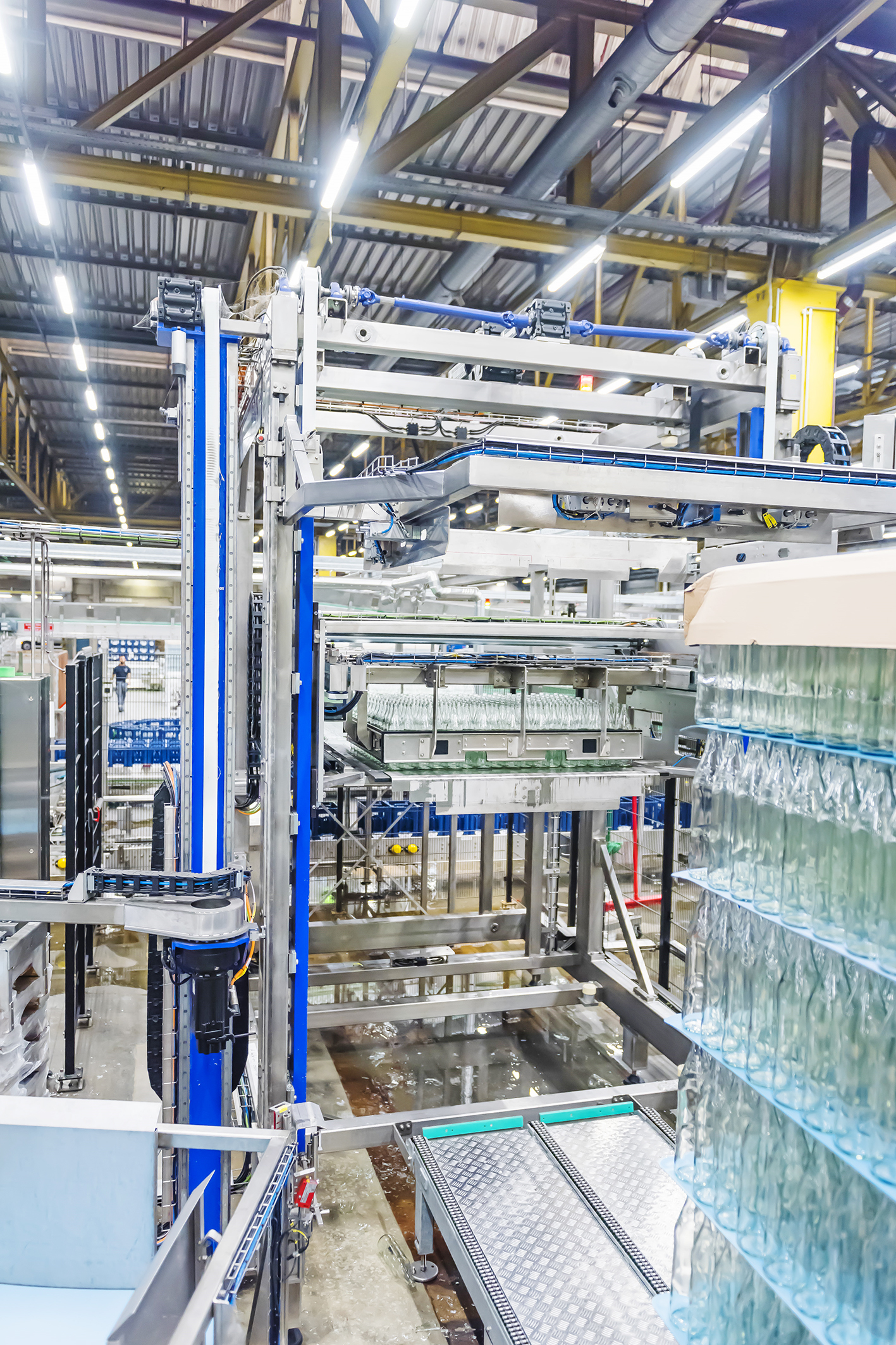 With the installed new glass sweep-off depalletiser of the type Unipal 202, Gerolsteiner can mechanically replace the rejected faulty bottles with new glass bottles.
With the installed new glass sweep-off depalletiser of the type Unipal 202, Gerolsteiner can mechanically replace the rejected faulty bottles with new glass bottles.
Conveying of the packs at a height of three metres
The production bottles are subsequently placed in Gerolsteiner crates by the secondary-type packer and also conveyed to the wet part. This is where a special detail had to be taken into account, says Jakoby. “The conveying of the packs in the dry part takes place to about 70 percent on a platform at a height of around three metres, as we are still planning plant 6. Its respective pack conveyor would then be underneath the current platform.” All machines in the dry part are, by contrast, at ground level. “Standard conveyors are used to provide the necessary level compensation. Spiral conveyors have not proved as good in the returnables sector”, Jakoby sums up.
Moreover, Gerolsteiner can replace missing bottles with new glass bottles using the installed sweep-off depalletiser. “In this way, only full crates reach the main-type unpacker, and this translates into the highest possible efficiency of the overall system”, Jakoby explains. At the same time, the infeed of pure new glass can also take place via this stream. The required empty crates in this case are automatically fed in from the wet part. Both the new glass sweep-off depalletiser as well as the secondary-type palletiser already have the required capacity reserve to also serve the future plant 6.
The foreign bottles are also placed by the secondary-type packer into Gerolsteiner crates which are then taken over by the secondary-type palletiser. After palletising, both the secondary types and the main types from the wet part are stored in five buffer stations from which they are subsequently discharged.
From commissioning to acceptance in eight weeks
„The speed in which the entire plant was ramped up was most impressive“, Jakoby recalls. In fact, it took only about eight weeks from commissioning to the successful acceptance being granted through VLB Berlin. Jakoby goes on to say: “We had not actually planned the acceptance until the end of March 2022. However, due to the super ramp-up of the entire plant, acceptance was granted as early as December 21 and 22, 2021.“ A remarkable achievement, especially against the backdrop of Covid conditions that were hampering construction site work.
Key drivers for this rapid implementation were the two BMS developments “Virtual Commissioning” and “LOP 4.0“. In “Virtual Commissioning” a computer simulation is used in the run-up to an investment to clarify how the task set by the customer can be implemented in a technically and economically sound way. At Gerolsteiner this concerned the design of the pallet conveying. “Virtual Commissioning”, however, goes well beyond mere computer simulation. The tool controls exactly the same PLC that will be used by the customer, and this in turn drives the simulation“. The findings acquired during these tests – practically under operating conditions – help optimise the plant design as well as the later commissioning at the customer site.
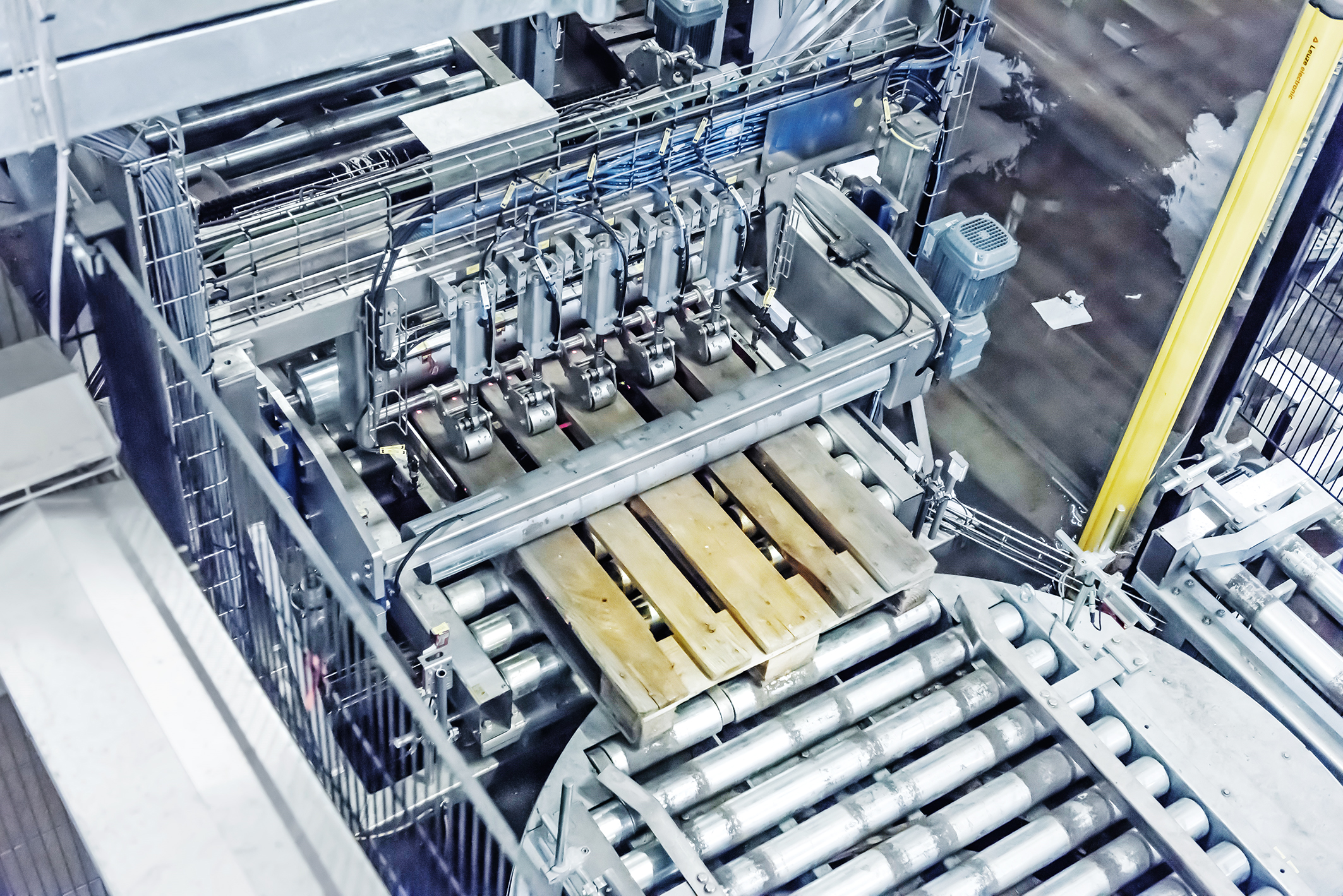 Besides pallet handling, the contract also included the entire bottle and pack conveying, a secondary-type packer of the type Unipack 2.0 as well as the required inspection technology
Besides pallet handling, the contract also included the entire bottle and pack conveying, a secondary-type packer of the type Unipack 2.0 as well as the required inspection technology
„LOP 4.0“ on the other hand is a cloud-based construction site management system to which all parties participating in the project have access. This digital platform maps the status of the project during the construction site phase with maximum transparency, from the delivery up to commissioning. “LOP 4.0” is also an open communication and documentation platform. Each project partner can, for instance, upload photos or videos, submit next steps for discussion purposes or prioritise individual items. This ensures that the status of all project phases is always up-to-date and displayed in a clearly understandable manner. In this way, any interactions on the further course are identified immediately. This results in fewer conflicts and fewer coordination losses, and the project can be planned most effectively. “LOP 4.0 is very good. It gives you an excellent overview of the project status. We were also able to bring in ideas for discussion, and respond to developments. This is really excellent. We are currently considering adopting LOP 4.0 for our own project management,” Jakoby adds. And he mentions another reason for quickly reaching the required performance data: “We were already familiar with the operation of the dry part and the packer/unpacker from plant 4. And because our operators also swap around within the plants, it is doubly advantageous to know the HOW.”
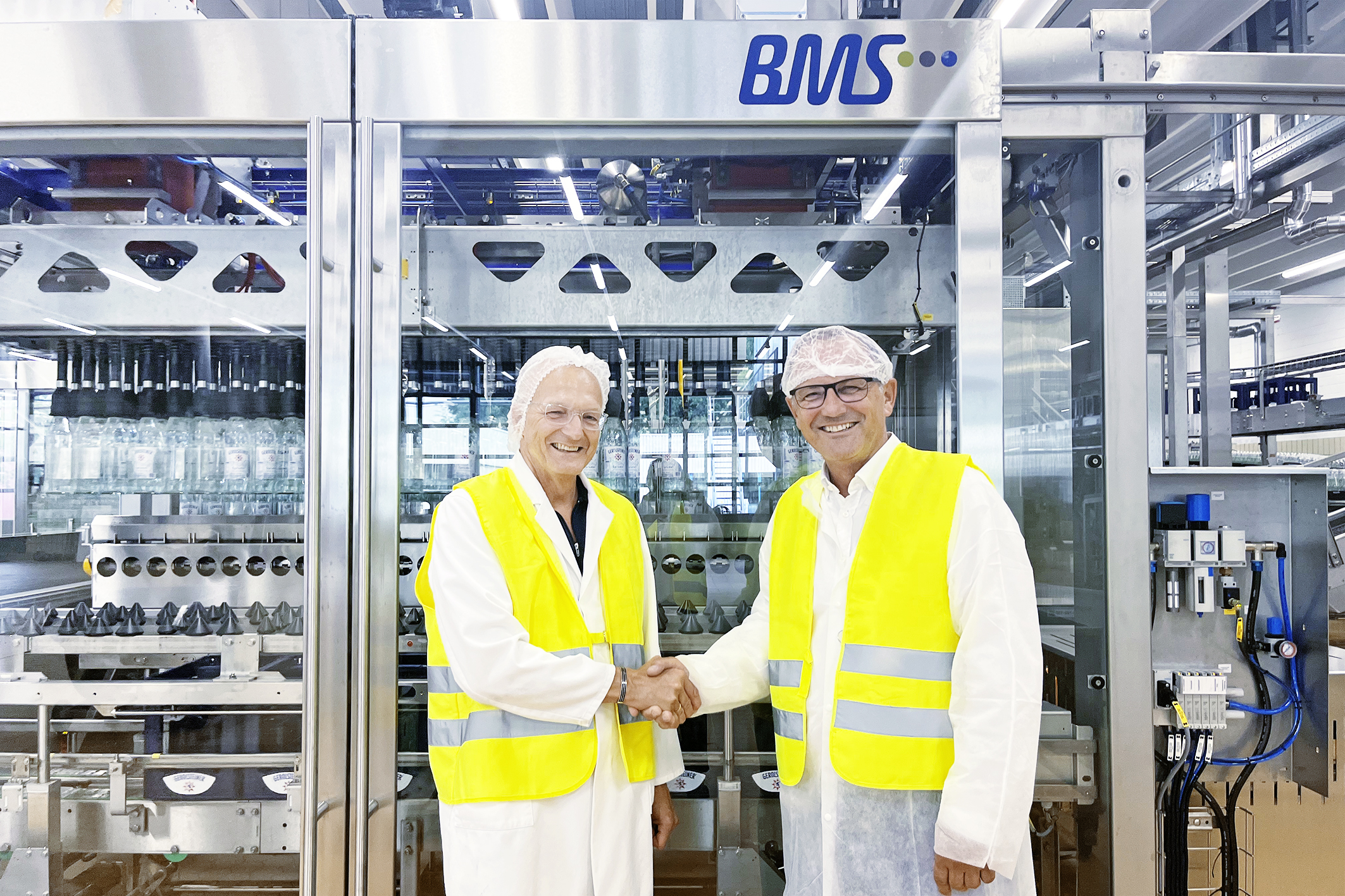 “It was a lot of fun again”. Ulrich Rust (left), managing director of technology and logistics at Gerolsteiner, and Thomas Lehmann, managing director of BMS, are delighted about a further successful project completed together.
“It was a lot of fun again”. Ulrich Rust (left), managing director of technology and logistics at Gerolsteiner, and Thomas Lehmann, managing director of BMS, are delighted about a further successful project completed together.
“It was a lot of fun, yet again“
Since then, the plant has proven its worth in tough day-to-day production. Three-shift operation on five days a week is standard, also on six days if necessary. “The plant is running so well that we sometimes prefer to leave another line standing in order to carry out production on plant 5”, Jakoby explains. So, all in all, is the conclusion just as positive as with the two previous projects? Absolutely, concludes Jakoby: “From the tender to acceptance, there was a very, very good cooperation. All our specifications and wishes were taken into account and implemented in an exemplary manner – without the words “extra effort” being mentioned even once. “For me it was a lot of fun, yet again.“

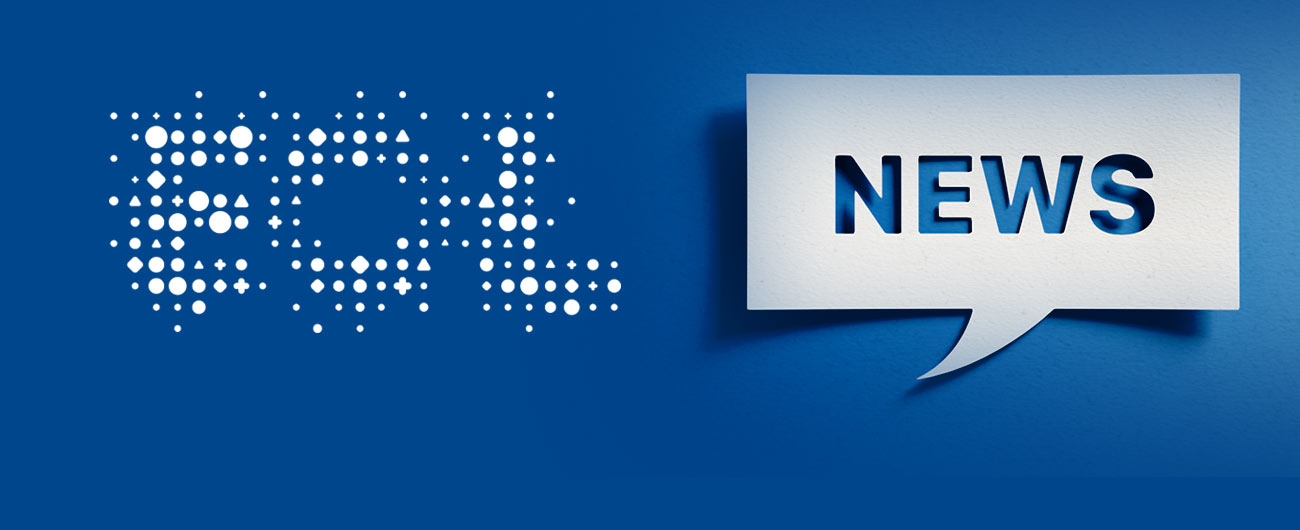
Select your language